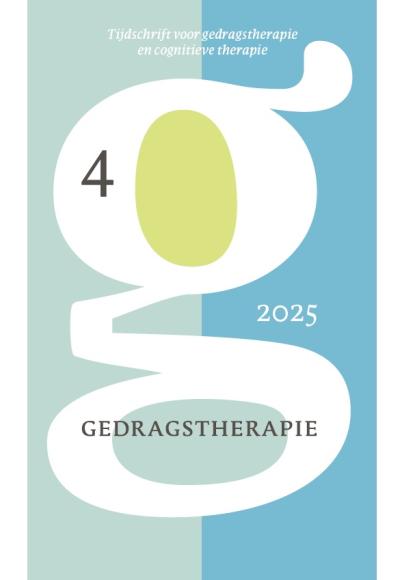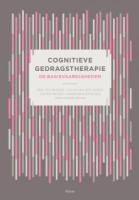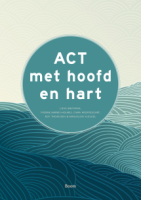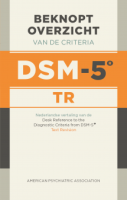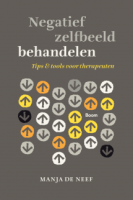Inhoud
Context en craving voor chocolade: extinctie en renewal in gezondheidsrelateerd gedrag
Samenvatting
In dit artikel wordt een samenvatting gegeven van eerder onderzoek (Van Gucht, Vansteenwegen, Beckers & Van den Bergh, 2008b; Van Gucht, Vansteenwegen, Van den Bergh & Beckers, 2008c) waarin een appetitief conditioneringsparadigma ontwikkeld werd om processen van craving en cravingreductie te onderzoeken met het oog op het beperken van terugval in verstoord eetgedrag en verslaafd gedrag. Naast craving werden ook andere afhankelijke maten opgenomen, namelijk de subjectieve verwachting en een gedragsmaat als index van toenaderings- en vermijdingstendensen. Meerdere experimenten leverden verrassende verschillen op tussen de maten. Subjectieve verwachting en automatisch toenaderingsgedrag namen af door een uitdovingsprocedure, maar keerden bij een verandering van context na de uitdovingsprocedure weer makkelijk terug (ABA renewal); in tegenstelling tot de verwachting en gedragstendens bleek craving helemaal niet uit te doven. Terugval kan bijgevolg zowel veroorzaakt worden door craving die niet uitdooft, als door terugkeer van voorbereidende reacties tengevolge een verandering van context na uitdoving (cf. de renewal in verwachtings- en gedragsmaat).
Literatuur
- Baeyens, F., Eelen, P., Van den Bergh, O., & Crombez, G. (1989). Acquired affective-evaluative value: Conservative but not unchangeable. Behaviour Research and Therapy, 27, 279-287.
- Bouton, M.E. (2000). A learning theory perspective on lapse, relapse, and the maintenance of behavior change. Health Psychology, 19, 57–63.
- Bouton, M.E. (2002). Context, ambiguity, and unlearning: Sources of relapse after behavioral extinction. Biological Psychiatry, 52, 976-986.
- Bouton, M.E., & Bolles, R. C. (1979). Contextual control of the extinction of conditioned fear. Learning and Motivation, 10, 445-466.
- Bouton, M.E., & Peck, C.A. (1989). Context effects on conditioning, extinction, and reinstatement in an appetitive conditioning preparation. Animal Learning & Behavior, 17, 188-198.
- Bouton, M.E., Woods, A.M., Moody, E.W., Sunsay, C., & Garcia-Gutiérrez, A. (2006). Counteracting the context-dependence of extinction: Relapse and tests of some relapse prevention methods. In M.G. Craske, D. Hermans, & D. Vansteenwegen (Eds.), Fear and learning: From basic processes to clinical implications (pp. 175-196). Washington, DC: American Psychological Association.
- Bradley, B., Field, M., Mogg, K., & De Houwer, J. (2004). Attentional and evaluative biases for smoking cues in nicotine dependence: Component processes of biases in visual orienting. Behavioural Pharmacology, 15, 29-36.
- Brooks, D.C., & Bouton, M.E. (1994). A retrieval cue for extinction attenuates response recovery (renewal) caused by a return to the conditioning context. Journal of Experimental Psychology: Animal Behavior Processes, 20, 366-379.
- Conklin, C.A., & Tiffany, S.T. (2002). Applying extinction research and theory to cue exposure addiction treatments. Addiction, 97, 155-167.
- Cooper, S.E. (1989). Chemical dependency and eating disorders: Are they really so different? Journal of Counseling and Development, 68, 103-105.
- De Houwer, J., Thomas, S., & Baeyens, F. (2001). Associative learning of likes and dislikes: A review of 25 years of research on human evaluative conditioning. Psychological Bulletin, 127, 853-869.
- Drummond, D.C., Tiffany, S., Glautier, S., & Remington (Eds.). (1995). Addictive behaviour: Cue exposure theory and practice. New York: Wiley.
- Hermans, D., Crombez, G., Vansteenwegen, D., Baeyens, F., & Eelen, P. (2002). Expectancy-learning and evaluative learning in human classical conditioning: Differential effects of extinction. In S. P. Shohov (Ed.), Advances in Psychology Research, Vol. 12 (pp. 17-41). Huntington, NY: Nova Science.
- Jansen, A. (1998). A learning model of binge eating: Cue reactivity and cue exposure. Behaviour Research and Therapy, 36, 257-272.
- Mogg, K., Bradley, B.P., Field, M., & De Houwer, J. (2003). Eye movements to smoking related pictures in smokers: Relationship between attentional biases and implicit and explicit measures of stimulus valence. Addiction, 98, 825-836.
- Pavlov, I.P. (1927). Conditioned reflexes. Oxford, UK: Oxford University Press.
- Rogers, P.J., & Smit, H.J. (2000). Food craving and food "addiction": A critical review of the evidence from a biopsychosocial perspective. Pharmacology Biochemistry and Behavior, 66, 3-14.
- Rozin, P., Levine, E., & Stoess, C. (1991). Chocolate craving and liking. Appetite, 17, 199 212.
- Van Gucht, D., Baeyens, F., Vansteenwegen, D., Hermans, D., & Beckers, T. (in druk). Counterconditioning reduces cue-induced craving and actual cue-elicited consumption. Emotion.
- Van Gucht, D., Vansteenwegen, D., Beckers, T., Hermans, D., Baeyens, F., & Van den Bergh, O. (2008a). Repeated exposure effects on subjective and physiological indices of chocolate craving. Appetite, 50, 19-24.
- Van Gucht, D., Vansteenwegen, D., Beckers, T., & Van den Bergh, O. (2008b). Return of experimentally induced chocolate craving after extinction: Divergence between craving and US-expectancy. Behaviour Research and Therapy, 46, 375-391.
- Van Gucht, D., Vansteenwegen, D., Van den Bergh, O., & Beckers, T. (2008c). Conditioned craving cues elicit an automatic approach tendency. Behaviour Research and Therapy, 46, 1160-1169.
- Vansteenwegen, D., Dirikx, T., Hermans, D., Vervliet, B., & Eelen, P. (2006). Renewal and reinstatement of fear: Evidence form human conditioning research. In M. G. Craske, D. Hermans, & D. Vansteenwegen (Eds.), Fear and learning: From basic processes to clinical implications (pp. 197-215). Washington, DC: American Psychological Association.
- Vansteenwegen, D., Francken, G., Vervliet, B., Declerq, A., & Eelen, P. (2006). Resistance to extinction in evaluative conditioning. Journal of Experimental Psychology: Animal Behavior Processes, 32, 71-79.
- Weingarten, H., & Elston, D. (1991). Food cravings in a college population. Appetite, 17, 167-175.
 © 2009-2026 Uitgeverij Boom Amsterdam
© 2009-2026 Uitgeverij Boom Amsterdam
De artikelen uit de (online)tijdschriften van Uitgeverij Boom zijn auteursrechtelijk beschermd. U kunt er natuurlijk uit citeren (voorzien van een bronvermelding) maar voor reproductie in welke vorm dan ook moet toestemming aan de uitgever worden gevraagd:
Behoudens de in of krachtens de Auteurswet van 1912 gestelde uitzonderingen mag niets uit deze uitgave worden verveelvoudigd, opgeslagen in een geautomatiseerd gegevensbestand, of openbaar gemaakt, in enige vorm of op enige wijze, hetzij elektronisch, mechanisch door fotokopieën, opnamen of enig andere manier, zonder voorafgaande schriftelijke toestemming van de uitgever.
Voor zover het maken van kopieën uit deze uitgave is toegestaan op grond van artikelen 16h t/m 16m Auteurswet 1912 jo. Besluit van 27 november 2002, Stb 575, dient men de daarvoor wettelijk verschuldigde vergoeding te voldoen aan de Stichting Reprorecht te Hoofddorp (postbus 3060, 2130 KB, www.reprorecht.nl) of contact op te nemen met de uitgever voor het treffen van een rechtstreekse regeling in de zin van art. 16l, vijfde lid, Auteurswet 1912.
Voor het overnemen van gedeelte(n) uit deze uitgave in bloemlezingen, readers en andere compilatiewerken (artikel 16, Auteurswet 1912) kan men zich wenden tot de Stichting PRO (Stichting Publicatie- en Reproductierechten, postbus 3060, 2130 KB Hoofddorp, www.cedar.nl/pro).
No part of this book may be reproduced in any way whatsoever without the written permission of the publisher.
Inloggen VGCt en VVGT
Leden van de VGCt en de VVGT loggen in via de site van hun vereniging. Als u op die site bent ingelogd als lid, vindt u daar een button naar het Tijdschrift voor Gedragstherapie.
English
Behavioral Therapy: Journal for Behavioral Therapy and Cognitive Therapy ISSN 0167-7454
Information in English can be found here.



